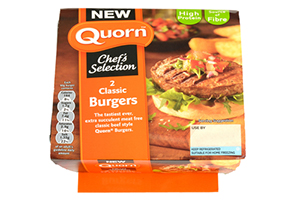 Heavy meat-eaters and people looking to transition to a vegetarian or vegan diet who want to cut down on their meat consumption have long looked for a healthy meat substitute that is not just soy or vegetable extract.
Heavy meat-eaters and people looking to transition to a vegetarian or vegan diet who want to cut down on their meat consumption have long looked for a healthy meat substitute that is not just soy or vegetable extract.
Researchers have now discovered one such soy-free substitute that contains equally good protein as meat and that can prevent and reduce obesity and type 2 diabetes.
Plus, even the most devoted meat-eaters swear to its deliciousness!
In April 2016, the British Journal of Nutrition published an article by researchers from Imperial College London proving mycoprotein was able to reduce insulin release and calorie intake in overweight people.
Mycoprotein is the product that results from the growth and fermentation of the fusarium venenatum fungus in glucose syrup, oxygen, carbon dioxide, nitrogen, vitamins, and minerals.
While it sounds utterly disgusting, you have nothing to complain about if you already eat fungi in the form of mushrooms.
Between the 1960s and 1980s, mycoprotein was originally grown as a way to beat world hunger, as its ability to double in size in just a few hours makes it an abundant source of protein-packed nutrition.
As often happens to such noble projects, it has now ended up with the middle classes in developed countries where it has made its way into meat substitute products under the label Quorn. Is now available throughout Europe, North America, and large parts of the rest of the planet.
The Imperial College researchers conducted two trials with 55 overweight participants, giving them meals containing mycoprotein.
Compared to meals containing chicken, mycoprotein reduced the participants’ energy intake by 10 percent (67 calories) and reduced their insulin concentration by up to 21%. It did not affect their blood glucose levels, rate of gastric emptying, or satiety.
This goes a long way to tackling the insulin tolerance that gives rise to type 2 diabetes. First, because it is a low-carbohydrate meal relative to its weight and calories. Second, because it prevents an overdose of insulin to be dumped into the bloodstream by the pancreas.
Every 100 grams (approximately 3.5 ounces) of mycoprotein contains 11 grams of protein that, like meat, holds all the amino acids that our bodies need. This is therefore a much more complete protein source than soy.
Moreover, every 100 grams also contains six grams of fiber, which is largely believed to account for its beneficial effects on diabetes and obesity.

 Overcoming IBD
Overcoming IBD Multiple Sclerosis
Multiple Sclerosis Banishing Bronchitis
Banishing Bronchitis Gum Disease Gone
Gum Disease Gone Overcoming Onychomycosis
Overcoming Onychomycosis Neuropathy No More
Neuropathy No More The Prostate Protocol
The Prostate Protocol Brain Booster
Brain Booster
 Ironbound
Ironbound
 Solution for Shingles
Solution for Shingles
 The Bone Density Solution
The Bone Density Solution
 The Ultimate Healing Protocol
The Ultimate Healing Protocol
 The Parkinson's Protocol
The Parkinson's Protocol
 The Chronic Kidney Disease Solution
The Chronic Kidney Disease Solution
 Overthrowing Anxiety
Overthrowing Anxiety The Fatty Liver Solution
The Fatty Liver Solution The Hypothyroidism Solution
The Hypothyroidism Solution
 The End of Gout
The End of Gout The Blood Pressure Program
The Blood Pressure Program
 The Oxigized Cholesterol Strategy
The Oxigized Cholesterol Strategy
 Stop Snoring And Sleep Apnea Program
Stop Snoring And Sleep Apnea Program
 The Arthritis Strategy
The Arthritis Strategy The Vertigo & Dizziness Program
The Vertigo & Dizziness Program The 3-Step Diabetes Strategy
The 3-Step Diabetes Strategy Hemorrhoids Healing Protocol
Hemorrhoids Healing Protocol The Erectile Dysfunction Master
The Erectile Dysfunction Master Weight Loss Breeze
Weight Loss Breeze The IBS Program
The IBS Program The Insomnia Program
The Insomnia Program The Migraine and Headache Program
The Migraine and Headache Program The Neck Pain Solution
The Neck Pain Solution The Menopause Solution
The Menopause Solution The Ejaculation Master
The Ejaculation Master The TMJ Solution
The TMJ Solution The Acid Reflux Solution
The Acid Reflux Solution The Fibromyalgia Solution
The Fibromyalgia Solution The Psoriasis Strategy
The Psoriasis Strategy